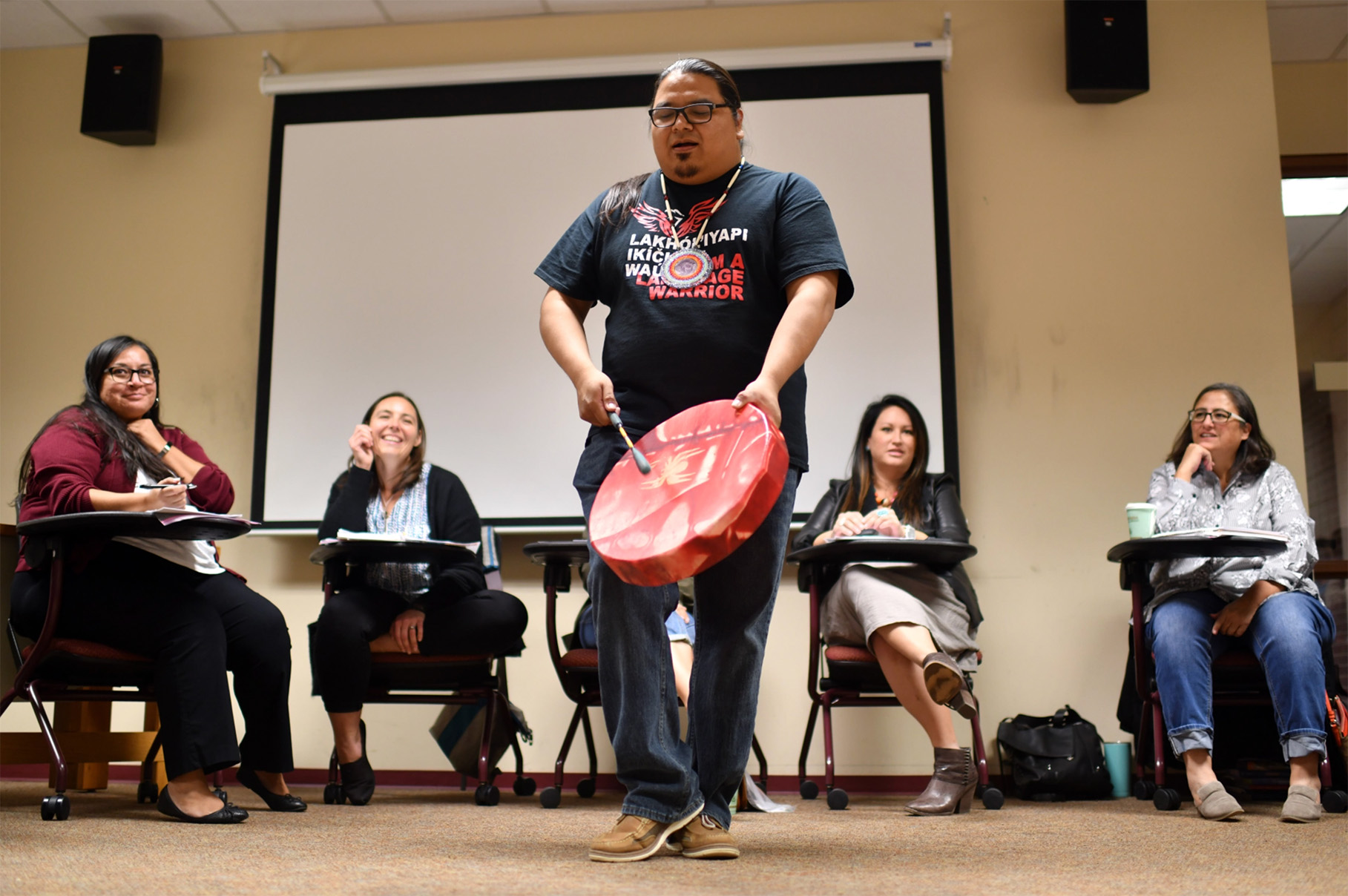Lakota Language Gets Boost at DU Conference
Two-day event is part of the Native American language revitalization movement
Monte Whaley | The Denver Post | October 20, 2018

Lakota Language Instructor Allen Wilson, front, is teaching the language with the rhythm of drum Oct. 20, 2018. The Lakota Language Weekend, a crash course on Lakota language and culture is being held at the University of Denver. The workshop was open to people of all backgrounds, and geared towards beginners. Students learned basic vocabulary, grammar and practical sentences for everyday life.
People such as Gwen Holmes are basically doing triage work in a desperate attempt to keep the Lakota language and culture alive in the United States.
“I wouldn’t say it’s extinct, but it’s definitely endangered,” the soft-spoken Holmes said Saturday during a Lakota Language Weekend at the University of Denver.
Nearby about 60 students of all ages were getting crash courses on the Lakota alphabet and pronunciation, basic grammar and how to use practical sentences for everyday life. Instructors were from the world-renowned Lakota Summer Institute and organized by the Lakota Language Consortium.
Organizers of the two-day event said the classwork is part of the Native American language revitalization movement, which is working to keep indigenous languages from dying, said Wilhelm Meya, chairman of The Language Conservancy, based in Indiana. “Indigenous languages are already disappearing at a rapid pace, and it’s an unknown but growing crisis,” Meya said.
At least 99 percent of existing Native American languages will vanish within our lifetimes, Meya said. There are about 150,000 Lakota left in the United States, and only about 1,500 are fluent speakers, making the training of new Lakota speakers pivotal to preserving the language, he said.
And by saving it, the Lakota culture survives, said Viki Eagle, director of Native American Community Relations & Programs at DU. “The Lakota language especially tells the tale of the culture. Every word has a special meaning and context,” Eagle said.
The workshop was open to people of all backgrounds and geared toward beginners. Besides the basics, the courses also talked about cultural values and using traditional songs to demonstrate how consistent spelling supports pronunciation and comprehension, Meya said.
“What we are doing today is stabilizing the free fall,” Meya said.
Lakota Language Weekends are held throughout the country, including New York and Chicago, Meya said. People are attracted to the romantic legacy of the tribe, which includes Sitting Bull, a Hunkpapa Lakota leader who led confederated Lakota tribes with the Northern Cheyenne to defeat the 7th Cavalry under Lt. Col. George Armstrong Custer on June 25, 1876, at the Battle of the Little Bighorn.
“For a lot of people, the Lakota are a special group,” Meya said.
Like most Native American tribes, the Lakota didn’t write down their language but passed it down through songs and stories.
And many of the tribe’s youths don’t see it as something they need to learn, said Alexis White Hat, an 18-year-old DU student who attended Saturday’s session. Her grandfather, Albert White Head Sr., wrote a book about the Lakota language and tried to teach it to her and her cousins. but they weren’t interested.
“We were kids and didn’t want to listen to that stuff,” Alexis said. “Only later did I realize, ‘Oh, wow, I really missed out.”
Holmes said her mother, a Lakota, attended a boarding school for tribal children, and they were told not to speak their native tongue or they would be harshly punished. “So they grew up refusing to speak Lakota, and they passed that reluctance along to their children,” Holmes said.
Holmes, however, learned it from her grandparents, and now she possesses a master’s degree in linguistics. She teaches Lakota at the Denver Center for International Studies, which teaches multilingual skills to high schoolers preparing for college.
“I think it’s great these weekends are held,” Holmes said. “It gives a me a little hope that this language will stay alive.”
The push to revive Native American languages, including Lakota, isn’t meant to supplant English, he said. Rather it gives native peoples a choice in pursuing a second language. But if that language vanishes, so does the opportunity to lean about the culture, he said.

